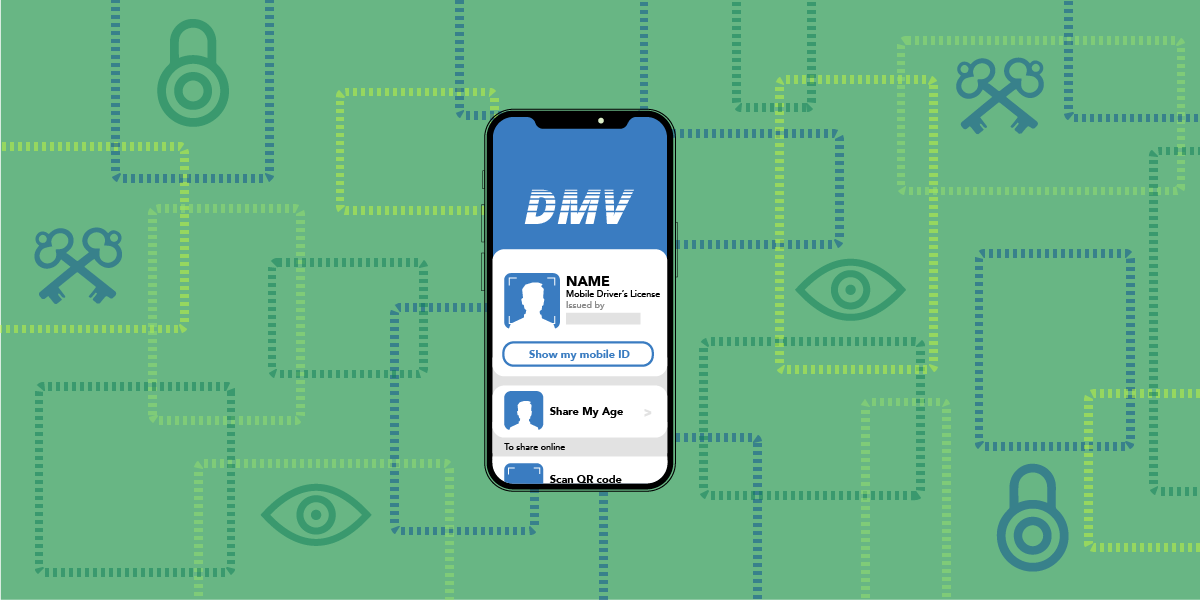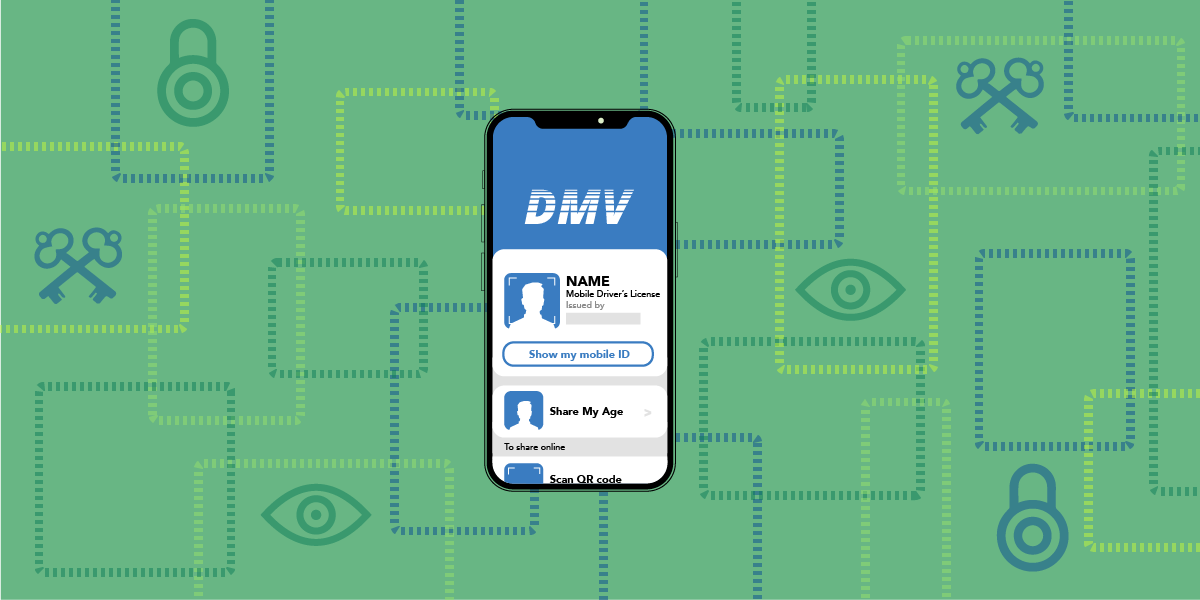A mobile driver’s license (often called an mDL) is a version of your ID that you keep on your phone instead of in your pocket. In theory, it would work wherever your regular ID works—TSA, liquor stores, to pick up a prescription, or to get into a bar. This sounds simple enough, and might even be appealing—especially if you’ve ever forgotten or lost your wallet. But there are a few questions you should ask yourself before tossing your wallet into the sea and wandering the earth with just your phone in hand.
In the United States, some proponents of digital IDs promise a future where you can present your phone to a clerk or bouncer and only reveal the information they need—your age—without revealing anything else. They imagine everyone whipping through TSA checkpoints with ease and enjoying simplified applications for government benefits. They also see it as a way to verify identity on the internet, a system that likely censors everyone.
There are real privacy and security trade-offs with digital IDs, and it’s not clear if the benefits are big enough—or exist at all—to justify them.
But if you are curious about this technology, there are still a few things you should know and some questions to consider.
Questions to Ask Yourself
Can I even use a Digital ID anywhere?
The idea of being able to verify your age by just tapping your phone against an electronic reader—like you may already do to pay for items—may sound appealing. It might make checking out a little faster. Maybe you won’t have to worry about the bouncer at your favorite bar creepily wishing you “happy birthday,” or noting that they live in the same building as you.
Most of these use cases aren’t available yet in the United States. While there are efforts to enable private businesses to read mDLs, these credentials today are mainly being used at TSA checkpoints.
For example, in California, only a small handful of convenience stores in Sacramento and Los Angeles currently accept digital IDs for purchasing age-restricted items like alcohol and tobacco. TSA lists airports that support mobile driver’s licenses, but it only works for TSA PreCheck and only for licenses issued in eleven states.
Also, “selective disclosure,” like revealing just your age and nothing else, isn’t always fully baked. When we looked at California’s mobile ID app, this feature wasn’t available in the mobile ID itself, but rather, it was part of the TruAge addon. Even if the promise of this technology is appealing to you, you might not really be able to use it.
Is there a law in my state about controlling how police officers handle digital IDs?
One of our biggest concerns with digital IDs is that people will unlock their phones and hand them over to police officers in order to show an ID. Ordinarily, police need a warrant to search the content of our phones, because they contain what the Supreme Court has properly called “the privacies of life.”
There are some potential technological protections. You can technically get your digital ID read or scanned in the Wallet app on your phone, without unlocking the device completely. Police could also have a special reader like at some retail stores.
But it’s all too easy to imagine a situation where police coerce or trick someone into unlocking their phone completely, or where a person does not even know that they just need to tap their phone instead of unlocking it. Even seasoned Wallet users screw up payment now and again, and doing so under pressure amplifies that risk. Handing your phone over to law enforcement, either to show a QR code or to hold it up to a reader, is also risky since a notification may pop up that the officer could interpret as probable cause for a search.
Currently, there are few guardrails for how law enforcement interacts with mobile IDs. Illinois recently passed a law that at least attempts to address mDL scenarios with law enforcement, but as far as we know it’s the only state to do anything so far.
At the very minimum, law enforcement should be prohibited from leveraging an mDL check to conduct a phone search.
Is it clear what sorts of tracking the state would use this for?
Smartphones have already made it significantly easier for governments and corporations to track everything we do and everywhere we go. Digital IDs are poised to add to that data collection, by increasing the frequency that our phones leave digital breadcrumbs behind us. There are technological safeguards that could reduce these risks, but they’re currently not required by law, and no technology fix is perfect enough to guarantee privacy.
For example, if you use a digital ID to prove your age to buy a six-pack of beer, the card reader’s verifier might make a record of the holder’s age status. Even if personal information isn’t exchanged in the credential itself, you may have provided payment info associated with this transaction. This collusion of personal information might be then sold to data brokers, seized by police or immigration officials, stolen by data thieves, or misused by employees.
This is just one more reason why we need a federal data privacy law: currently, there aren’t sufficient rules around how your data gets used.
Do I travel between states often?
Not every state offers or accepts digital IDs, so if you travel often, you’ll have to carry a paper ID. If you’re hoping to just leave the house, hop on a plane, and rent a car in another state without needing a wallet, that’s likely still years away.
How do I feel about what this might be used for online?
Mobile driver’s licenses are a clear fit for online age verification schemes. The privacy harms of these sorts of mandates vastly outweigh any potential benefit. Just downloading and using a mobile driver’s license certainly doesn’t mean you agree with that plan, but it’s still good to be mindful of what the future might entail.
Am I being asked to download a special app, or use my phone’s built-in Wallet?
Both Google and Apple allow a few states to use their Wallet apps directly, while other states use a separate app. For Google and Apple’s implementations, we tend to have better documentation and a more clear understanding of how data is processed. For apps, we often know less.
In some cases, states will offer Apple and Google Wallet support, while also providing their own app. Sometimes, this leads to different experiences around where a digital ID is accepted. For example, in Colorado, the Apple and Google Wallet versions will get you through TSA. The Colorado ID app cannot be used at TSA, but can be used at some traffic stops, and to access some services. Conversely, California’s mobile ID comes in an app, but also supports Apple and Google Wallets. Both California’s app and the Apple and Google Wallets are accepted at TSA.
Apps can also come and go. For example, Florida removed its app from the Apple App Store and Google Play Store completely. All these implementations can make for a confusing experience, where you don’t know which app to use, or what features—if any—you might get.
The Right to Paper
For now, the success or failure of digital IDs will at least partially be based on whether people show interest in using them. States will likely continue to implement them, and while it might feel inevitable, it doesn’t have to be. There are countless reasons why a paper ID should continue to be accepted. Not everyone has the resources to own a smartphone, and not everyone who has a smartphone wants to put their ID on it. As states move forward with digital ID plans, privacy and security are paramount, and so is the right to a paper ID.
Note: The Real ID Modernization Act provides one protection for using a mDL we initially missed in this blog post: if you present your phone to federal law enforcement, it cannot be construed as consent to seize or search the device.








